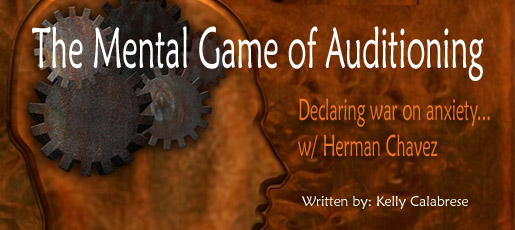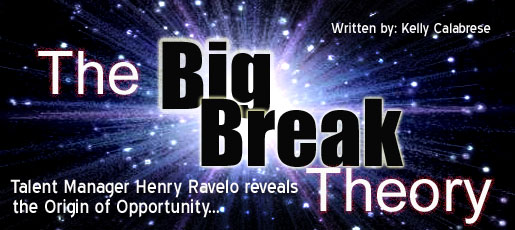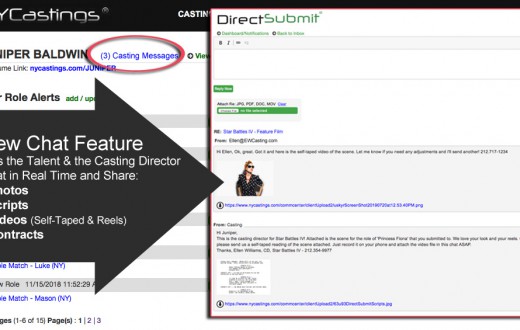Declaring war on anxiety…
Herman Chavez launched a tactic called “The Mental Game of Auditioning” – aimed at empowering actors and relieving that self-destructive fear of auditioning.
Through a strategy that targets an actor’s psyche, the sides and the business of entertainment, Herman Chavez builds up an actor’s mental arsenal so they “win” at every audition, by performing at the top of their game, in every environment or circumstance.
Testimonials abound about Herman Chavez’s Mental Game of Auditioning, yet NYCastings took an interest because our own Top Booker of 2009, Lauren Francesca, cited this source as her secret weapon.
From the creator of this artful approach, Herman Chavez, here are 13 ways in which The Mental Game of Auditioning can help you take your acting career up a level…
Insights from Herman Chavez
I. LAYING PLANS – How “The Mental Game of Auditioning” idea started:
![]() No one wants to get up in the morning and give a crappy audition. And one day it dawned on me that when I was younger I used to box and was never afraid to step into a ring against someone ready to chop my head off. So, why am I afraid of someone who looks like a librarian? There was something there that I wasn’t hooking into. It wasn’t the scene. It was something else. So, I started applying all this sports psychology to the auditions and came to the conclusion that, just like a fighter, the most important part of the audition process is the walk from the locker to the ring. If their mindset isn’t where it is supposed to be, then the three months of training went out the window.
No one wants to get up in the morning and give a crappy audition. And one day it dawned on me that when I was younger I used to box and was never afraid to step into a ring against someone ready to chop my head off. So, why am I afraid of someone who looks like a librarian? There was something there that I wasn’t hooking into. It wasn’t the scene. It was something else. So, I started applying all this sports psychology to the auditions and came to the conclusion that, just like a fighter, the most important part of the audition process is the walk from the locker to the ring. If their mindset isn’t where it is supposed to be, then the three months of training went out the window.
Then, a casting director came into my life, named Margaret Burns, and taught me how to tackle the scene. And, my biggest hero is Bruce Lee and I drew a lot from him too. From this combination, I came to the conclusion that auditions are a street fight and scene study is sports boxing. In class, you have a referee, there are rules, it’s a sport. But the auditions are visceral and alive. It’s now. That’s why you need something that is systematic, pragmatic, simple and right to the point.
In my opinion, auditioning is 90% mental and 10% technical. There are so many talented actors out there and the mental gets in their way.
II. WAGING WAR – Identifying the Enemy:
The biggest cause of fear is the desperation of wanting to book the job.
Basically actors need to clarify that acting is what they do, not who they are. Many actors link their identity to the success and that is a big NO, NO.
III. THE PLAN OF ATTACK – What to shoot for:
Unfortunately, a lot of acting teachers say, “Don’t think about it. Just go in there and knock them dead.” That is misinformation. When it comes down to it, what an actor really needs to do is not self-abandon themselves. To be true to their interpretation.
I tell my actors to say, “Always be relaxed, both physically and mentally, totally engaged with my reader, listening to everything he or she says to me, executing my interpretation fully and freely.” That’s what it always comes down to. The first take is always your interpretation, so it’s not about knocking them dead.
IV. TACTICAL POSITIONING – How to always look good:
 At the end of the day, it comes down to two main things for a casting director: #1 is that the main buyer continues to circulate business into the office so the casting director can continue to get work.
At the end of the day, it comes down to two main things for a casting director: #1 is that the main buyer continues to circulate business into the office so the casting director can continue to get work.
#2 is that everyone who comes in makes the casting director look good by giving a fully committed interpretation of the scene. If 8 actors come in, and the producers says, “where did you get all these actors from? They are all wonderful,” then the casting director looks good and is happy.
Of course, when they pick #8, the other 7 think they sucked because they didn’t get cast but they actually won because now the casting director keeps them in their circle of trust.
It’s about going in there, consistently, and putting the casting director at ease. That’s where actors need to focus their thoughts, not on worrying if their agent is going to be mad if they don’t book or any other pressures. You have to approach it like an athlete and have that tunnel vision. A pro is basically someone who doesn’t buy into labels or mystique. The go in, see it for what it is and don’t believe the hype. They do not worry if it is Warner Brothers that they are going into.
V. ENERGY – Building a positive foundation:
When I work with actors, there are three columns I address. The main column is what I call your mental makeup, the individual mental luggage. A lot of that has to do with childhood and parents. The second column is scene work and the third is the business (agents, casting directors, etc). But everything starts with the first column because you are never going to approach an agent if your mindset isn’t right. You are never going to have a confident audition or even make an appointment if your mindset is not right.
VI. ILLUSION AND REALITY – Why actors need a reality check:
Acting is the only business where you do not get an instant response of how bad an auditioner you are. If you are a comedian on stage in New York City, in a minute and a half you are going to know if you suck or not. If you are a boxer, you will step into the ring and know within 40 seconds if you have what it takes to make it. But this business can be very deceptive. You can get delusional, the years start piling up and its easy for you to say, It’s not me. It’s the casting director.
VII. ENGAGING THE FORCE – It takes an effort:
There is a book called Outliers: The Story of Success, by Malcolm Gladwell, that talks about how many hours it takes to master a skill. I have been with my casting director for ten years. When I am in class and show actors how to tackle a scene, they want to be able to it that quickly too. But they have to put in the time. Many actors do not have an ambition to be good. They have an ambition to be famous, to make money, to have a lot of people know who they are. But they do not have an ambition to be good and you have to take huge responsibility for your product.
VIII. VARIATION IN TACTICS – How Herman works with each actor:
Every actor has a folder and what we discuss stays in that room. I approach each actor the way I approach myself. I went to a therapist, who was an actor, and would speak about my blocks and my mental stuff with my auditions. I take from all my years and experiences. There are questions I ask the actor. I pinpoint where the weak muscles are and prescribe things that have helped me whether it is books, documentaries, shows, etc.
Actors have sports psychologists, a strength coach, conditioners, etc. All an actor has is a teacher that works with them on scene work. It’s like going into war with a slingshot. I honestly feel that is the one two combination I have of sports psychology and how to tackle the scene, works.
IX. MOVING THE FORCE – Getting into top condition:
I recommend that each actor works with me for eight months and eight months isn’t even a long time. When you go to the gym and hire a personal trainer, the first month your body is saying, Excuse me? We are going to what? The second month your body is saying, Ok, so this is a new norm for us. And by the third month your body knows that this is the way it is going to be from now on. So, eight months is nothing. And, normally when we get to the sixth month we test it to make sure it is working. Depending on the actor’s type we target a casting director at one of those meet and greets. They get the scene the night before, we prep it and then test it. You’ve got to step in and fight.
X. TERRAIN – Understanding how the environment affects you:
When someone goes into a room and gets stiff, or one-dimensional, it could be something as simple as being overwhelmed by the people in the room, of not trusting them, or anticipatory anxiety, fear of success, fear of failure. It is endless. Which is why I prefer to work with actors one on one and address the individual pinpoint of what is really causing the problem.
XII. THE ATTACK BY FIRE – Why Herman’s approach spreads like wildfire:
I am very fortunate that the actors spread news about me by word of mouth. I am a bicoastal actor. I have a recurring role on Made in America, I’m about to shoot a pilot in two weeks called Legal Mind, I’ve worked on Law and Orders, 24, and Without A Trace (etc). Actors have no control over how often they get booked. So, I want actors to have fun. I want actors to enjoy auditioning the way I do, because that is all we have.
XIII. THE USE OF SPIES – Learning from active players:
I’m auditioning and am fortunate enough to get work, so I can let people know what it’s like to go into Warner Brothers or the top casting places in the city. A lot of acting teachers are well intended, but they might not be out there now. Actors are at a disadvantage to not get that current information.
I also show my students clips of Russell Crowe’s audition, Tom Hanks and Robert Downey Junior because in boxing I watched Muhammad Ali and wanted to know how he trained. I don’t care how they are training in the gym. I want to know how those professionals, those heroes of mine, are training, so that my audition can be that good or even better.
Thank you Herman Chavez for divulging details about “The Mental Game of Auditioning” with NYCastings. For more information visit www.thementalgameofauditioning.com







